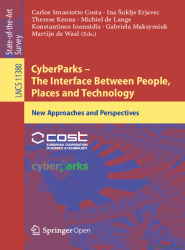CyberParks – The Interface Between People, Places and Technology
Table of contents
| Pages : | 331 |
| Size : | 27.5 MB |
| File type : | |
| Downloads: | 85 |
| Created: | 2022-02-02 |
| License: | CC BY |
| Author(s): | Carlos Smaniotto Costa, Ina Šuklje Erjavec, Therese Kenna, Michiel de Lange, Konstantinos Ioannidis, Gabriela Maksymiuk, Martijn de Waal |

Warning: Trying to access array offset on false in /home/tutovnfz/public_html/article.php on line 233
Others related eBooks about CyberParks – The Interface Between People, Places and Technology
Intel Xeon Phi Coprocessor Architecture and ToolsDownload free course Intel Xeon Phi Coprocessor Architecture and Tools, pdf file on 220 pages by Rezaur Rahman....
A Brief Introduction to Machine Learning for EngineersThis book aims at providing an introduction to key concepts, algorithms, and theoretical frameworks in machine learning, including supervised and unsupervised learning, statistical learning theory, probabilistic graphical models and approximate inference. The intended readership consists of electric...
Kubernetes SuccinctlyDownload free course Kubernetes Succinctly, pdf file on 121 pages by Rahul Rai, Tarun Pabbi....
New Applications of Artificial IntelligenceThis book has a complete set of applications of artificial neural networks that allow the reader to gain experience about the new systems for implementing and developing artificial intelligence (AI) methods, which can run in several digital systems. On the other hand, the book shows the newest alg...
Xamarin.Forms for macOS SuccinctlyDownload free course Xamarin.Forms for macOS Succinctly, pdf file on 122 pages by Alessandro Del Sole....
Think ComplexityDownload free course Think Complexity, pdf file on 228 pages by Allen Downey....
Cloud Computing - Architecture and ApplicationsIn the era of Internet of Things and with the explosive worldwide growth of electronic data volume, and associated need of processing, analysis, and storage of such humongous volume of data, it has now become mandatory to exploit the power of massively parallel architecture for fast computation. ...
Algorithms Notes for ProfessionalsDownload free course Algorithms Notes for Professionals, pdf file on 257 pages by by Stack Overflow Community....
Think OCamlDownload free course Think OCaml, pdf file on 142 pages by Allen Downey, Nicholas Monje....
Test-Driven iOS Development with SwiftTest-driven development (TDD) is a proven way to find software bugs early. Writing tests b..., download free Testing tutorial in PDF (218 pages) created by Dr. Dominik Hauser ....